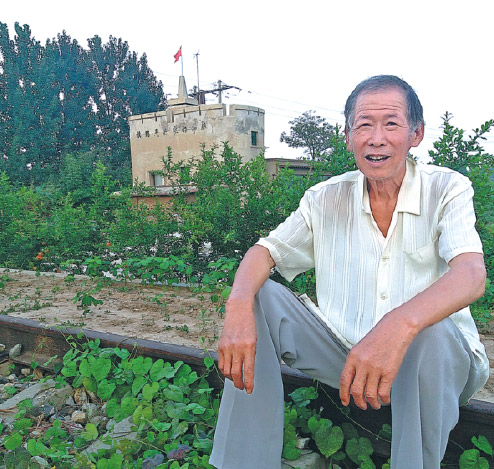Former soldier fights to preserve Hebei war relic
Voluntary guard believes protecting the site helps people understand history
 |
|
Cao Wentong sits on railway tracks in front of a watchtower built by Japanese troops during the War of Resistance Against Japanese Aggression (1931-45) in Cangxian county, Hebei province. [Photo by LYU HONGYOU/CHINA DAILY] |
A retired soldier has voluntarily guarded a military watchtower in Hebei province for about three decades in the hope future generations can learn from it.
The tower in Jiedi village was built by Japanese troops during the War of Resistance Against Japanese Aggression (1931-45).
Cao Wentong, 67, moved to a home near the tower when he was 36, as he aimed to protect it from other villagers.
"It is evidence of Japanese invaders' monstrous crimes in China, which we Chinese should never forget," he said, adding that to understand history, people need to see such relics.
The tower, which is made of concrete and bricks, is 4.43 meters high and has a footprint of about 40 square meters, according to Cangxian county's cultural heritage protection bureau.
Gun slots were placed in the walls for the Japanese soldiers to fire through. The watchtower was used to protect the Tianjin-Pukou railway, on which the Japanese transported supplies, the bureau said.
"Nobody can say how many Chinese villagers were killed here, only that it was too many," Cao said.
His father's aunt and his wife's grandfather were shot and killed by Japanese soldiers in 1937 at the start of Japan's full-scale invasion of China. "My family can never forget the brutalities committed by Japanese troops," he said.
Out of a sense of patriotism, Cao served in the army for five years until 1974. After being discharged from the military, he returned to his hometown and found the tower in a state of disrepair.
According to Cao, villagers used to come to the area to dig up earth to build houses, which gradually caused damage to the tower.
"For about a decade, I tried my best to stop them and even quarreled with them if they didn't listen to me," he said, adding that many people didn't realize the significance of the tower.
At the time, Cao was working as a carpenter and was not able to keep an eye on the site 24 hours a day. But in 1986, the local government gave him permission to build a house near the watchtower, making it easier for him to look after it.
"My wife was opposed to me protecting the tower because it took me away from my job, " he said.
"She wanted me to focus on making money while I was young and strong, but she couldn't stop me."
After decades of effort, villagers have started to share Cao's views and the tower has been listed by the county government as a protected cultural relic.
As a result, the tower has become increasingly popular, and heritage experts from different provinces have visited the site.
"They told me it is the only tower along the railway built by the Japanese," Cao said.
The tower has also become an educational site, attracting school students, soldiers and public servants. Cao often acts as a guide, recounting the watchtower's history.
"To know and understand history, they need to see real evidence and hear what happened back in the 1940s," he said.
This year marks the 80th anniversary of the start of nationwide war against Japanese aggression in 1937. To commemorate the occasion, Cao repaired part of the tower wall, which had been damaged by rain.
"This is my way to remember history and cherish peace," he said.














